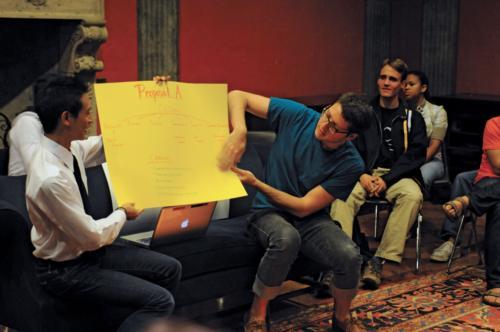
News
Cambridge Residents Slam Council Proposal to Delay Bike Lane Construction

News
‘Gender-Affirming Slay Fest’: Harvard College QSA Hosts Annual Queer Prom

News
‘Not Being Nerds’: Harvard Students Dance to Tinashe at Yardfest

News
Wrongful Death Trial Against CAMHS Employee Over 2015 Student Suicide To Begin Tuesday

News
Cornel West, Harvard Affiliates Call for University to Divest from ‘Israeli Apartheid’ at Rally
QSA Debates Restructuring

The Harvard College Queer Students and Allies debated revamping its structure in an effort to grow its active membership at a meeting in Adams House yesterday that drew a higher than expected turnout.
The organization’s co-chairs pushed for a plan that would shift at least some portion of the group’s decision-making capacity from a select cluster of executive board members to a series of committees that would seek to give more people a say in decision-making.
Proposed changes included reducing the number of committee chairs to one from two per committee, creating an outreach committee, and promoting frequent committee meetings where definitive decisions can be made.
The organization’s co-chairs, Christian L. Garland ’10 and Marco Chan ’11, led the “Queer Town Hall,” which drew at least 35 students—substantially more than the number who typically attend the club’s meetings, according to Garland, who termed the turnout “unprecedented.”
Currently, Garland said, the group—which changed its name last semester from the Biseuxal, Gay, Lesbian, Transgender, and Supporters Alliance—has “anywhere between nine and 700 members,” depending who is counted: board members or people on the e-mail list.
Attendees proposed different ways to involve more of Harvard’s queer community in the organization.
While Garland and Chan also discussed the possibility of continuing to make decisions through weekly meetings of the committee chairs, they spent the bulk of their time advocating their more grass roots and committee-focused option—and in an informal poll after the meeting, those in attendance showed their tentative support for their plan.
But despite the nearly unanimous support for structural changes, more controversial issues were raised. Some voiced their concerns that certain groups, particularly Queer women and bisexuals, were not being adequately represented by the QSA. They called for more female leadership in the organization and for identity-specific breakout meetings.
“I come into this room and I see it’s about 80 percent men,” said Emily S. Unger ’13. “I find it off-putting and it’s not that comfortable for me to come to QSA events, which is a problem.”
The group also discussed QSA’s role among queer identity groups on campus.
Nothing was decided at the meeting, but Garland and Chan said they plan on presenting new proposals based on yesterday’s feedback at their next executive board meeting. Executive board meetings are open to the public.
—Staff writer Eric P. Newcomer can be reached at newcomer@fas.harvard.edu.
Want to keep up with breaking news? Subscribe to our email newsletter.
